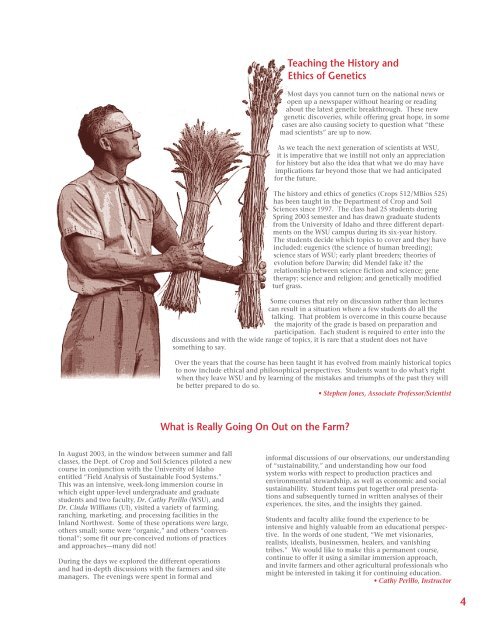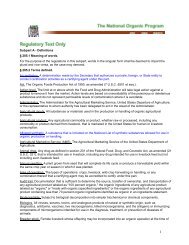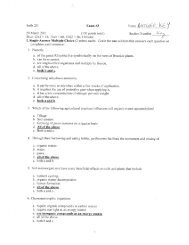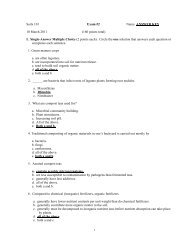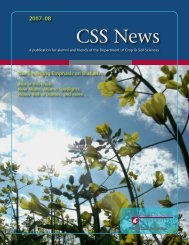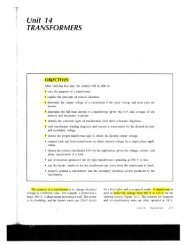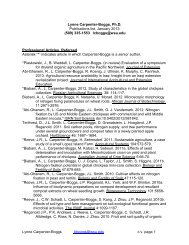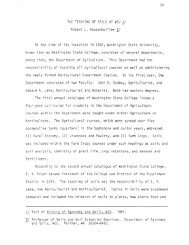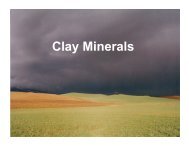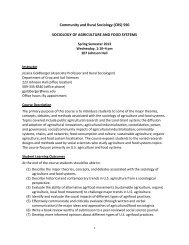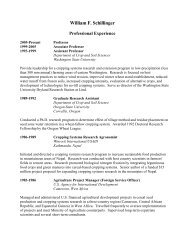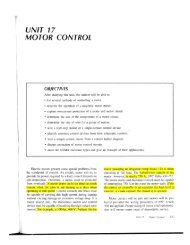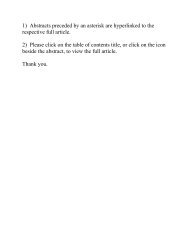CSS News 2003-04 pdf - Dept. of Crop and Soil Sciences ...
CSS News 2003-04 pdf - Dept. of Crop and Soil Sciences ...
CSS News 2003-04 pdf - Dept. of Crop and Soil Sciences ...
Create successful ePaper yourself
Turn your PDF publications into a flip-book with our unique Google optimized e-Paper software.
In August <strong>2003</strong>, in the window between summer <strong>and</strong> fall<br />
classes, the <strong>Dept</strong>. <strong>of</strong> <strong>Crop</strong> <strong>and</strong> <strong>Soil</strong> <strong>Sciences</strong> piloted a new<br />
course in conjunction with the University <strong>of</strong> Idaho<br />
entitled “Field Analysis <strong>of</strong> Sustainable Food Systems.”<br />
This was an intensive, week-long immersion course in<br />
which eight upper-level undergraduate <strong>and</strong> graduate<br />
students <strong>and</strong> two faculty, Dr. Cathy Perillo (WSU), <strong>and</strong><br />
Dr. Cinda Williams (UI), visited a variety <strong>of</strong> farming,<br />
ranching, marketing, <strong>and</strong> processing facilities in the<br />
Inl<strong>and</strong> Northwest. Some <strong>of</strong> these operations were large,<br />
others small; some were “organic,” <strong>and</strong> others “conventional”;<br />
some fit our pre-conceived notions <strong>of</strong> practices<br />
<strong>and</strong> approaches—many did not!<br />
During the days we explored the different operations<br />
<strong>and</strong> had in-depth discussions with the farmers <strong>and</strong> site<br />
managers. The evenings were spent in formal <strong>and</strong><br />
Teaching the History <strong>and</strong><br />
Ethics <strong>of</strong> Genetics<br />
Most days you cannot turn on the national news or<br />
open up a newspaper without hearing or reading<br />
about the latest genetic breakthrough. These new<br />
genetic discoveries, while <strong>of</strong>fering great hope, in some<br />
cases are also causing society to question what “these<br />
mad scientists” are up to now.<br />
As we teach the next generation <strong>of</strong> scientists at WSU,<br />
it is imperative that we instill not only an appreciation<br />
for history but also the idea that what we do may have<br />
implications far beyond those that we had anticipated<br />
for the future.<br />
The history <strong>and</strong> ethics <strong>of</strong> genetics (<strong>Crop</strong>s 512/MBios 525)<br />
has been taught in the Department <strong>of</strong> <strong>Crop</strong> <strong>and</strong> <strong>Soil</strong><br />
<strong>Sciences</strong> since 1997. The class had 25 students during<br />
Spring <strong>2003</strong> semester <strong>and</strong> has drawn graduate students<br />
from the University <strong>of</strong> Idaho <strong>and</strong> three different departments<br />
on the WSU campus during its six-year history.<br />
The students decide which topics to cover <strong>and</strong> they have<br />
included: eugenics (the science <strong>of</strong> human breeding);<br />
science stars <strong>of</strong> WSU; early plant breeders; theories <strong>of</strong><br />
evolution before Darwin; did Mendel fake it? the<br />
relationship between science fiction <strong>and</strong> science; gene<br />
therapy; science <strong>and</strong> religion; <strong>and</strong> genetically modified<br />
turf grass.<br />
Some courses that rely on discussion rather than lectures<br />
can result in a situation where a few students do all the<br />
talking. That problem is overcome in this course because<br />
the majority <strong>of</strong> the grade is based on preparation <strong>and</strong><br />
participation. Each student is required to enter into the<br />
discussions <strong>and</strong> with the wide range <strong>of</strong> topics, it is rare that a student does not have<br />
something to say.<br />
Over the years that the course has been taught it has evolved from mainly historical topics<br />
to now include ethical <strong>and</strong> philosophical perspectives. Students want to do what’s right<br />
when they leave WSU <strong>and</strong> by learning <strong>of</strong> the mistakes <strong>and</strong> triumphs <strong>of</strong> the past they will<br />
be better prepared to do so.<br />
• Stephen Jones, Associate Pr<strong>of</strong>essor/Scientist<br />
What is Really Going On Out on the Farm?<br />
informal discussions <strong>of</strong> our observations, our underst<strong>and</strong>ing<br />
<strong>of</strong> “sustainability,” <strong>and</strong> underst<strong>and</strong>ing how our food<br />
system works with respect to production practices <strong>and</strong><br />
environmental stewardship, as well as economic <strong>and</strong> social<br />
sustainability. Student teams put together oral presentations<br />
<strong>and</strong> subsequently turned in written analyses <strong>of</strong> their<br />
experiences, the sites, <strong>and</strong> the insights they gained.<br />
Students <strong>and</strong> faculty alike found the experience to be<br />
intensive <strong>and</strong> highly valuable from an educational perspective.<br />
In the words <strong>of</strong> one student, “We met visionaries,<br />
realists, idealists, businessmen, healers, <strong>and</strong> vanishing<br />
tribes.” We would like to make this a permanent course,<br />
continue to <strong>of</strong>fer it using a similar immersion approach,<br />
<strong>and</strong> invite farmers <strong>and</strong> other agricultural pr<strong>of</strong>essionals who<br />
might be interested in taking it for continuing education.<br />
• Cathy Perillo, Instructor<br />
4


